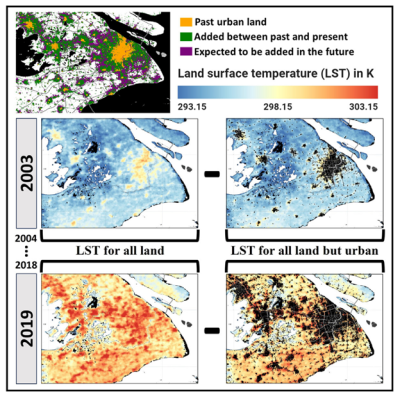Urbanization Exacerbates Continental- to Regional-Scale Warming
Urban impacts on climate are generally discussed at the local scale (like urban heat islands), with urban areas normally ignored in large-scale climate assessments. Combining millions of satellite-derived images of land surface temperature (LST) with dynamic urban area estimates, researchers demonstrated that the urban influence on continental- to regional-scale warming has become more detectable over time, especially for rapidly urbanizing regions and countries in Asia. They also estimated these large-scale urban warming signals under all shared socioeconomic pathways (SSPs) used to project global and regional climate change.
Based on these results, the researchers argue that, in line with other forms of land use/land cover change, urbanization should be explicitly included in future climate change assessments across scales. These patterns, also seen for air temperature (using a recent gridded air temperature dataset that resolves urban signals), reframe our understanding of urbanization in the climate system from only a local-scale phenomenon to one with non-negligible regional- and even continental-scale impacts. These results encourage the incorporation of dynamic urban extent and biophysics in current-generation Earth system models to quantify potential urban feedback on the climate system across scales.
Researchers combined satellite-derived estimates of land surface temperature (LST) with dynamic urban area estimates to show that the impact of urbanization on larger-scale warming has become more detectable over time, particularly in rapidly urbanizing regions and countries in Asia. Despite this, urbanization accounts for only about 2% of land warming during the study period and is not the primary cause of global warming. The study also estimated large-scale urban warming signals under all shared socioeconomic pathways (SSPs) used for projecting climate change. The researchers argue that urbanization, like other forms of land use/land cover change, should be explicitly included in future climate change assessments at various scales. These patterns suggest that urbanization has significant regional- and even continental-scale impacts, reframing its role in the climate system from merely a local-scale phenomenon.

